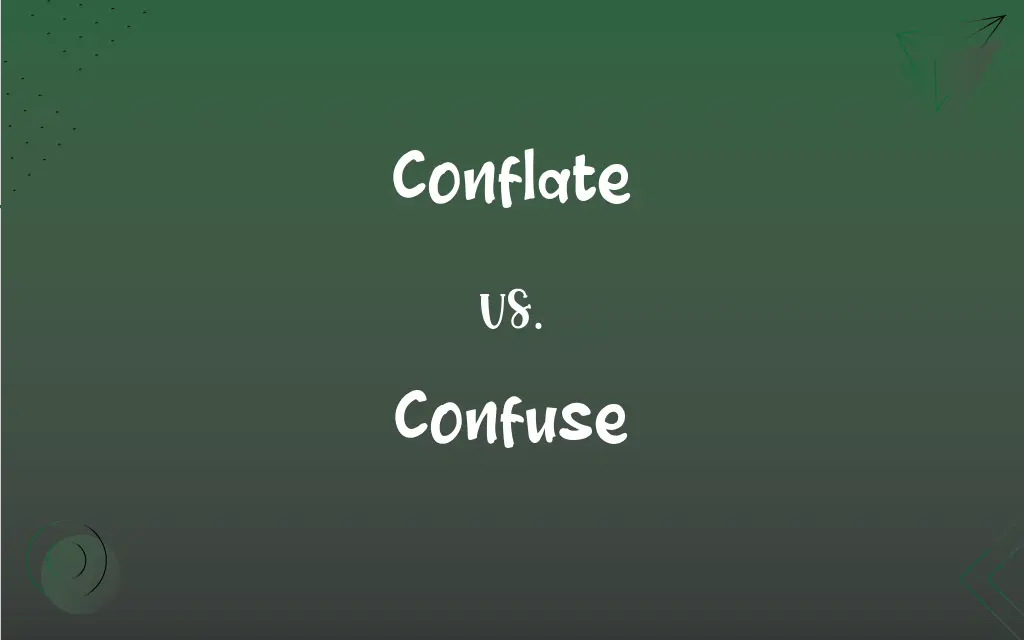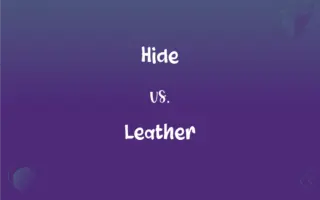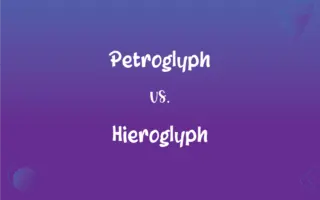Conflate vs. Confuse: What's the Difference?
Edited by Aimie Carlson || By Janet White || Updated on October 17, 2023
Correct spelling: Conflate - to combine two ideas into one. Confuse - to make unclear or difficult to understand.

Key Differences
"Conflate" has the word "late" in it, indicating two things coming together at a later point.
"Confuse" sounds like "confusion," both pointing towards a lack of clarity.
Think of "fl" in "Conflate" as "fusing" or merging things together.
"Confuse" has an 's', reminding of the "state" of not being sure.
"Conflate" means to blend, while "Confuse" disrupts clarity; blending vs. blurring.
ADVERTISEMENT
Conflate and Confuse Definitions
Conflate
Conflate is an incorrect spelling of Confuse.
Confuse
To make something more complicated or harder to perceive.
Too many details can confuse the main issue.
Confuse
To make someone uncertain or unable to understand something.
The directions really confuse me.
Confuse
To mix or blend so that things cannot be distinguished.
Don't confuse the two chemicals.
Confuse
To cause disorder or disarray.
The sudden noise confused the herd of deer.
ADVERTISEMENT
Confuse
To mistake one thing for another.
She often confuses me with my twin.
Confuse
To cause to be unable to think with clarity or act with intelligence or understanding; bewilder or perplex.
Confuse
(Archaic) To cause to feel embarrassment.
Confuse
To fail to differentiate (one person or thing) from another
Confused effusiveness with affection.
Confuse
To make more complex or difficult to understand
"The old labels ... confuse debate instead of clarifying it" (Christopher Lasch).
Confuse
To make something unclear or incomprehensible
A new tax code that only confuses.
Confuse
(transitive) to puzzle, perplex, baffle, bewilder somebody; to afflict by being complicated, contradictory, or otherwise difficult to understand
It confused me when I went to the office and nobody was there, but then I realised it was Sunday.
Confuse
(transitive) To mix up, muddle up one thing with another; to mistake one thing for another.
People who say "hola" to Italians are confusing Italian with Spanish.
Confuse
(transitive) To mix thoroughly; to confound; to disorder.
Confuse
To make uneasy and ashamed; to embarrass.
Confuse
To rout; discomfit.
Confuse
(intransitive) To be confused.
Confuse
Mixed; confounded.
Confuse
To mix or blend so that things can not be distinguished; to jumble together; to confound; to render indistinct or obscure; as, to confuse accounts; to confuse one's vision.
A universal hubbub wildOf stunning sounds and voices all confused.
Confuse
To perplex; to disconcert; to abash; to cause to lose self-possession.
Nor thou with shadowed hint confuseA life that leads melodious days.
Confused and sadly she at length replied.
Confuse
Mistake one thing for another;
You are confusing me with the other candidate
I mistook her for the secretary
Confuse
Be confusing or perplexing to; cause to be unable to think clearly;
These questions confuse even the experts
This question completely threw me
This question befuddled even the teacher
Confuse
Cause to feel embarrassment;
The constant attention of the young man confused her
Confuse
Assemble without order or sense;
She jumbles the words when she is supposed to write a sentence
Confuse
Make unclear or incomprehensible;
The new tax return forms only confuse
Confuse
Make unclear, indistinct, or blurred;
Her remarks confused the debate
Their words obnubilate their intentions
FAQs
What is the verb form of Confuse?
"Confuse" itself is a verb.
What is the pronunciation of Confuse?
Confuse is pronounced as kən-'fyooz.
What is the root word of Confuse?
The Latin word "confundere" is the root of "confuse."
Which vowel is used before Confuse?
It depends on context, but often "a" as in "a confused state."
What is the singular form of Confuse?
"Confuse" is already in its singular form.
Which preposition is used with Confuse?
"With" as in "confuse someone with someone else."
Which conjunction is used with Confuse?
It varies based on context; e.g., "and," "but," "or."
What is the plural form of Confuse?
Being a verb, "confuse" doesn't have a plural form. But nouns derived from it, like "confusion," would have plurals.
Is Confuse an adverb?
No, "Confuse" is not an adverb.
Why is it called Confuse?
Derived from Latin "confundere" meaning "to pour together", indicating a mix or blend of things into one.
Which article is used with Confuse?
"A" or "the" can be used depending on the context, especially when referring to derived nouns.
Is the word Confuse imperative?
It can be used in the imperative form, e.g., "Don't confuse the two!"
Is Confuse a negative or positive word?
Typically, it's seen as negative since it implies a lack of clarity or understanding.
Which determiner is used with Confuse?
It varies based on context; e.g., "this," "that," "my."
Is Confuse a noun or adjective?
"Confuse" is primarily a verb, but "confused" can be an adjective.
Is Confuse an abstract noun?
"Confusion," derived from "confuse," is an abstract noun.
Is Confuse a vowel or consonant?
The word "confuse" starts with a consonant.
Is the Confuse term a metaphor?
It can be used metaphorically in some contexts.
What is another term for Confuse?
Bewilder.
What is the opposite of Confuse?
Clarify.
How many syllables are in Confuse?
Two syllables.
What part of speech is Confuse?
"Confuse" is a verb.
Is Confuse a collective noun?
No, "Confuse" is not a collective noun.
How do we divide Confuse into syllables?
Con-fuse.
What is a stressed syllable in Confuse?
The second syllable "fuse" is stressed.
What is the first form of Confuse?
Confuse.
What is the second form of Confuse?
Confused.
How is Confuse used in a sentence?
Too much information can often confuse the reader.
Is Confuse a countable noun?
"Confuse" is a verb, not a noun.
What is the third form of Confuse?
Confused.
About Author
Written by
Janet WhiteJanet White has been an esteemed writer and blogger for Difference Wiki. Holding a Master's degree in Science and Medical Journalism from the prestigious Boston University, she has consistently demonstrated her expertise and passion for her field. When she's not immersed in her work, Janet relishes her time exercising, delving into a good book, and cherishing moments with friends and family.
Edited by
Aimie CarlsonAimie Carlson, holding a master's degree in English literature, is a fervent English language enthusiast. She lends her writing talents to Difference Wiki, a prominent website that specializes in comparisons, offering readers insightful analyses that both captivate and inform.































































